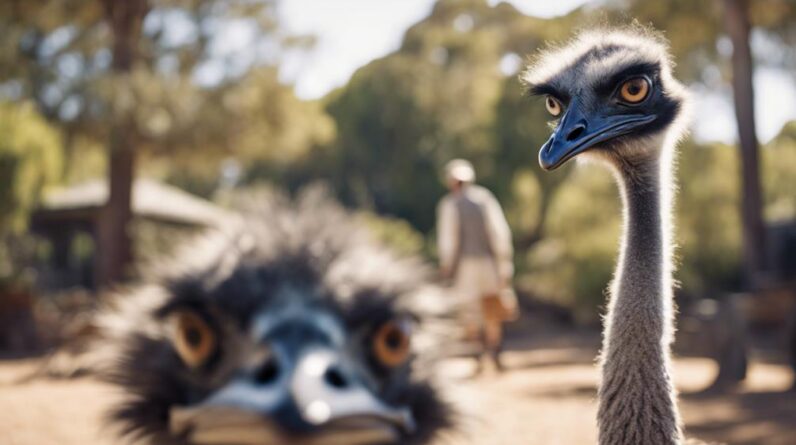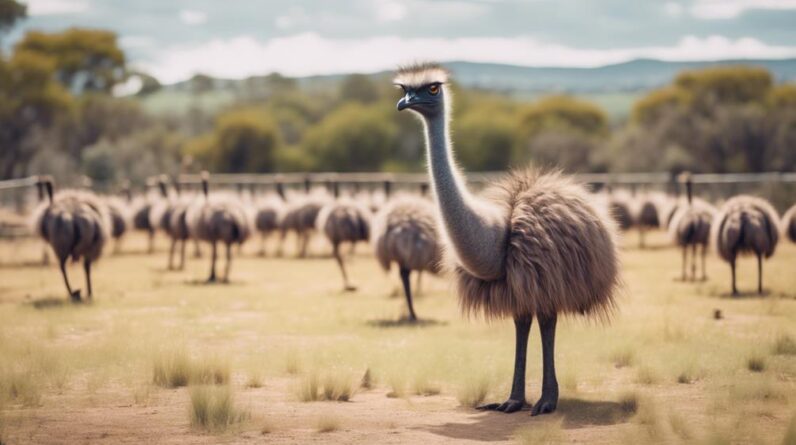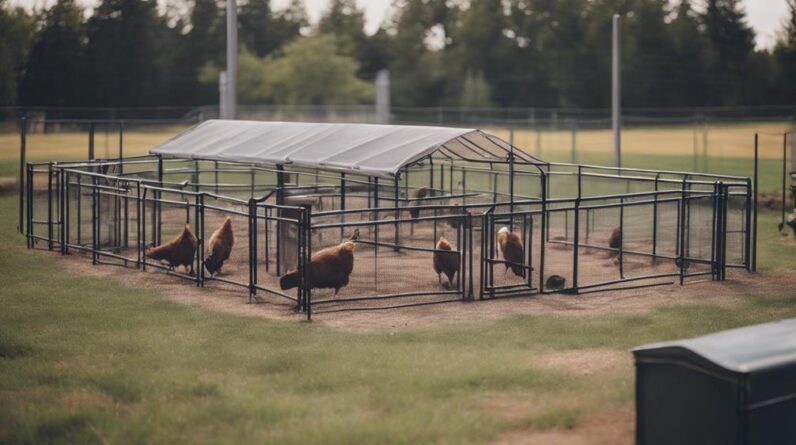
When it comes to breeding emus, understanding the best practices and ethical considerations is crucial.
From selecting the right breeding stock to providing proper housing and nutrition, there are several key factors to consider for successful breeding outcomes.
However, it's essential not only to focus on the technical aspects but also on the ethical considerations surrounding emu breeding.
By exploring the ethical dimensions of this practice, you can ensure that your breeding efforts are not only successful but also aligned with responsible and compassionate practices.
Key Takeaways
- Provide natural environments and ample space for emus' courtship displays.
- Select breeding pairs carefully to maintain genetic diversity and prevent inbreeding.
- Ensure proper housing, nutrition, and veterinary care for healthy breeding practices.
- Contribute to conservation efforts by following ethical breeding guidelines and promoting emu welfare.
Emu Breeding Basics

When breeding emus, focus on creating a comfortable and natural environment that supports their reproductive behaviors. Emus are fascinating creatures with unique mating rituals and reproductive cycles. To ensure breeding success and optimal fertility rates, it's crucial to understand and respect their natural instincts.
Emus have intricate mating behaviors that are essential to their breeding process. Males will dance and vocalize to attract females, showcasing their suitability as mates. Observing these behaviors can provide valuable insights into their reproductive readiness. Providing ample space for these courtship displays is vital for a successful breeding environment.
Understanding emus' reproductive cycles is key to maximizing breeding success. Females typically lay eggs during the cooler months, so ensuring they've access to suitable nesting areas is crucial. Monitoring their behavior and egg-laying patterns can help enhance fertility rates and overall breeding outcomes.
Understanding Emu Behavior
To truly understand emu behavior, observe their interactions and communication cues closely to decipher their intricate social dynamics. Emus exhibit fascinating social dynamics within their groups, showing a mix of hierarchical structures and cooperative behaviors. Pay attention to how they communicate through sounds, body language, and even their distinctive eye movements. These communication cues are essential for interpreting their intentions and emotional states.
Emus also display a range of instinctual behaviors influenced by their environment. For example, their foraging habits may vary based on factors such as food availability and predation risks. Understanding these behaviors can help you create a suitable environment for your emus, promoting their well-being and natural tendencies.
Selecting Breeding Stock

Observing and understanding the behavior of emus will guide you in selecting the most suitable breeding stock for your emu breeding program. When choosing breeding pairs, consider the following:
- Temperament: Emus with calm and docile temperaments are more likely to thrive in a breeding environment, creating a harmonious atmosphere for successful reproduction.
- Health: Select breeding stock that shows signs of robust health, such as clear eyes, smooth feathers, and a lively demeanor. Healthy emus are more likely to produce strong offspring.
- Genetic Diversity: Aim for genetic diversity within your breeding pairs to prevent inbreeding and maintain a strong and varied gene pool in your emu population. This will help avoid potential genetic health issues in future generations.
Creating Proper Housing
Proper housing for emus is essential to ensure their well-being and reproductive success. When designing housing for emus, consider their natural habitat. Emus thrive in spacious areas that allow them to roam freely. The enclosure should be secure, with fencing that's tall and strong to prevent escapes and protect them from predators.
Emus are sensitive to temperature changes, so climate control is crucial. Provide shelter that shields them from extreme heat or cold, and ensure proper ventilation to maintain air quality. Emus are curious birds, so enrich their environment with features like stumps, rocks, or hiding spots to stimulate their natural behaviors.
When designing the housing structure, prioritize simplicity for easy cleaning and maintenance. Emus are known to be messy, so choose materials that are durable and easy to sanitize. Regularly inspect the enclosure for wear and tear, repairing or replacing any damaged areas promptly.
Nutrition and Feeding Guidelines
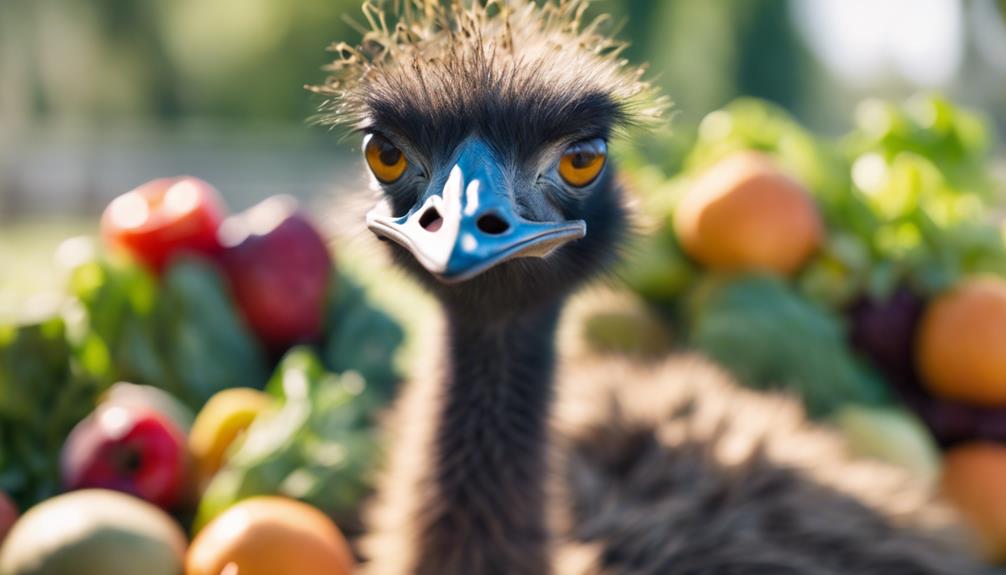
Consider the dietary needs of your emus to ensure their health and reproductive success. Emus have specific feeding strategies and dietary requirements that must be met for optimal breeding conditions. To provide the best nutrition for your emus, follow these guidelines:
- Variety is Key: Emus thrive on a diverse diet, including grasses, fruits, vegetables, and commercial emu feed. Offering a variety of foods ensures they receive all the necessary nutrients for their well-being.
- Balanced Nutritional Supplements: Incorporating nutritional supplements like calcium or vitamin E can be beneficial for your emus' overall health. Consult with a veterinarian to determine the right supplements to include in their diet.
- Establish Consistent Feeding Schedules: Emus do best with regular feeding schedules. Make sure to feed them at the same times each day to maintain their digestive health and overall routine.
Health Monitoring and Care
Regularly monitoring the health of your emus is crucial for maintaining their well-being and addressing any potential issues promptly. Emus are sensitive creatures that require attentive care to thrive. Ensuring proper temperature regulation in their environment is essential to prevent stress and disease. Emus can be susceptible to various health issues, so regular veterinary check-ups are highly recommended to detect any problems early on.
When it comes to disease prevention, practicing good hygiene in their living space and providing a balanced diet can go a long way. Additionally, managing stress is important for the overall health of your emus. Be mindful of any changes in behavior or appetite, as these can be indicators of underlying health issues.
Breeding Season Management

Maintaining the health of your emus through careful monitoring sets the foundation for successful breeding season management. During the breeding season, temperature control is crucial for creating optimal conditions for your emus. Keep a close eye on the ambient temperature in their environment, ensuring it remains within the ideal range to support breeding behaviors and overall well-being.
Emotional Care Tips:
- Patience: Emus have unique mating behaviors that may require time and understanding to observe and support.
- Empathy: Remember that breeding season can be a stressful time for your emus, so provide a calm and nurturing environment.
- Connection: Spend quality time observing your emus during this season to strengthen the bond and trust between you and your birds.
Incubation Techniques
During the incubation period, attentiveness to temperature and humidity levels is paramount for the successful development of emu eggs. Maintaining a consistent temperature between 97 to 98 degrees Fahrenheit and humidity around 45-55% is crucial. Here is a helpful table outlining key aspects of incubation techniques:
| Aspect | Details | Importance |
|---|---|---|
| Temperature control | Ensure a stable temperature range of 97-98°F | Vital for embryo development |
| Humidity levels | Maintain humidity at 45-55% throughout incubation | Affects egg moisture and hatching |
| Turning schedule | Turn the eggs 3-5 times a day for even heating | Prevents the embryo from sticking to the shell |
| Candling process | Check the development by shining a light through the egg | Helps monitor embryo growth and detect issues |
Hatching and Chick Care
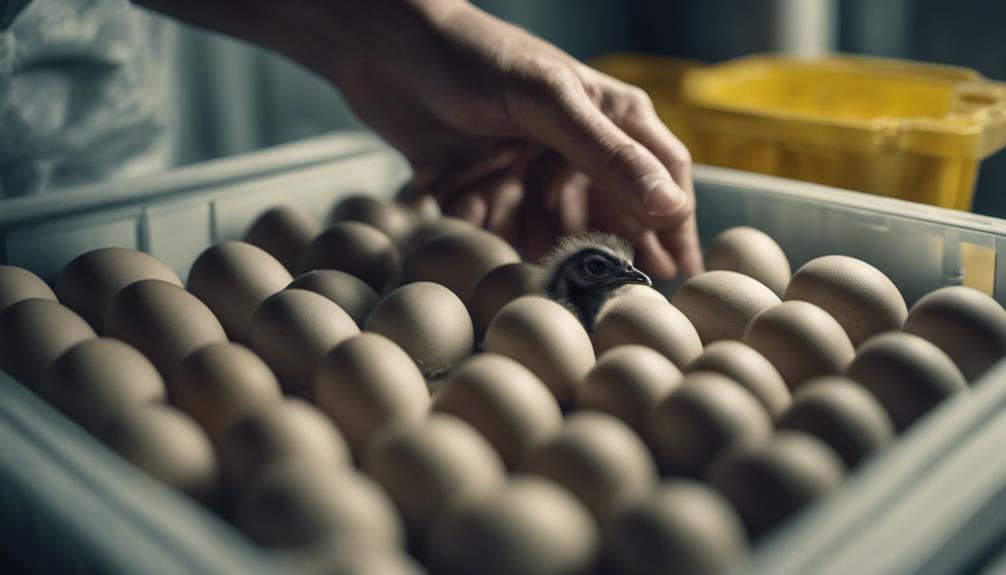
To ensure the successful hatching and care of emu chicks, meticulous attention to environmental conditions and proactive health monitoring is essential. Maintaining proper temperature regulation and following a consistent feeding schedule are crucial aspects of nurturing healthy emu chicks.
- Temperature Regulation: Emu chicks are sensitive to temperature fluctuations, so it's vital to provide a warm and stable environment for their growth and development.
- Feeding Schedule: Establishing a regular feeding routine is key to ensuring that the chicks receive the necessary nutrients for their well-being and growth.
- Egg Turning and Brooder Setup: Properly turning the emu eggs during incubation and setting up a suitable brooder are fundamental steps in fostering a safe and comfortable environment for the chicks to thrive.
Genetic Diversity Considerations
Ensuring a diverse genetic pool is crucial for the long-term health and vitality of your emu breeding program. By carefully considering genetic diversity, you can contribute to conservation efforts and mitigate inbreeding risks that may threaten the population health of your emus.
When planning your breeding programs, keep in mind the importance of maintaining a healthy balance of genetic variability within your emu flock. This can be achieved by periodically introducing new emus from different genetic lines to avoid excessive inbreeding. Monitoring the genetic diversity within your population is essential for the long-term success of your breeding efforts.
| Benefits of Genetic Diversity | |||||
|---|---|---|---|---|---|
| 1. Enhanced Adaptability | Diverse genetics help emus adapt to changing environments. | 2. Disease Resistance | Genetic variability can enhance immunity to various diseases. | 3. Long-Term Viability | A diverse gene pool ensures the long-term viability of your breeding program. |
Handling and Socialization
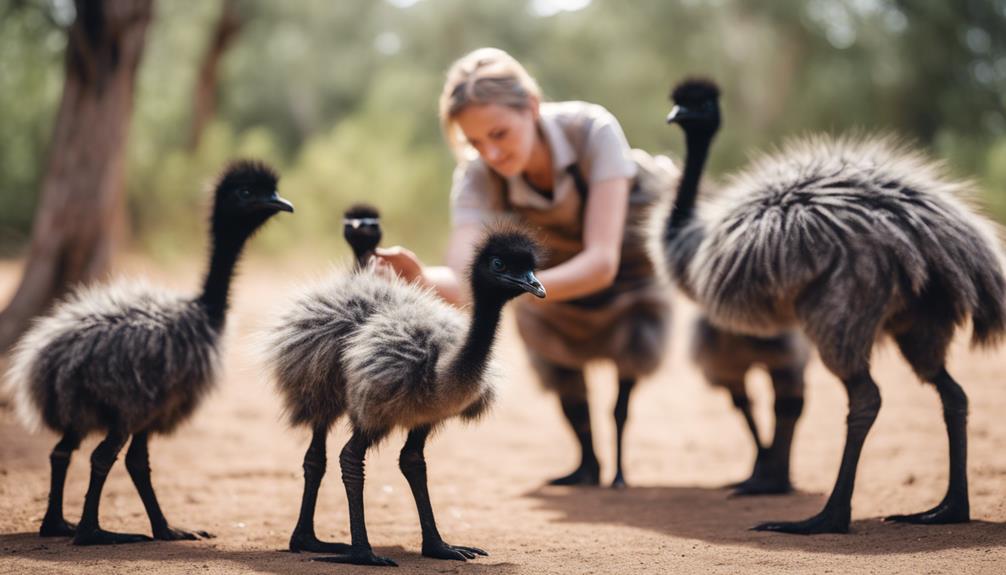
Maintaining a diverse genetic pool in your emu breeding program not only safeguards their long-term health but also sets the foundation for successful handling and socialization practices. Socializing emu chicks from a young age is crucial for their development. Spend time with them daily, speaking softly and offering treats to build trust.
Handling adult emus requires patience and respect for their space. Approach them calmly and confidently, avoiding sudden movements that may startle them. Here are some tips to ensure effective handling and socialization:
- Create a calm environment: Emus are sensitive animals, so keep noise levels low to help them feel secure.
- Use positive reinforcement: Reward good behavior with treats to encourage desirable social interactions.
- Be consistent: Establish a routine for handling and socializing your emus to build a sense of security and trust.
Responsible Breeding Practices
When considering responsible breeding practices for emus, prioritize the health and welfare of the birds above all else. Genetic testing plays a crucial role in ensuring the well-being of future generations. By conducting genetic tests, you can identify potential hereditary issues and make informed decisions to prevent passing on harmful traits.
Ethical breeding practices involve selecting breeding pairs carefully, taking into account not only their physical characteristics but also their temperament and overall health. This careful selection process contributes to maintaining the genetic diversity of the emu population and reduces the likelihood of hereditary diseases.
Additionally, it's essential to provide proper nutrition, spacious living conditions, and regular veterinary check-ups for breeding emus. Monitoring their behavior and addressing any signs of distress promptly are vital aspects of responsible breeding. Remember, healthy and happy emus are more likely to produce healthy offspring.
Frequently Asked Questions
Are Emus Prone to Any Specific Genetic Disorders That Breeders Should Be Aware Of?
Emus can have specific genetic disorders. It's crucial to conduct genetic screening and health monitoring. Stay vigilant to ensure the well-being of your emus. By being proactive, you can create a healthy breeding environment.
What Are the Potential Challenges of Breeding Emus in a Climate That Is Not Their Natural Habitat?
Navigating the unfamiliar climate challenges when breeding emus can be demanding. Ensure proper shelter, temperature control, and nutrition to mitigate stress. Genetic disorders should also be monitored closely for optimal breeding outcomes and emu well-being.
How Do Emus Typically React to Artificial Insemination Methods in Comparison to Natural Mating?
When it comes to artificial insemination versus natural mating, emus may show varied reactions. Some may adapt well to the process, while others may prefer the traditional approach. Understanding behavioral differences is key to ensuring reproductive success.
Are There Any Specific Regulations or Permits Required for Breeding Emus in Certain Regions?
In certain regions, breeding emus may require permits or adhere to specific regulations. Understanding the regional guidelines and permit requirements is crucial for navigating any breeding restrictions. Ensure you are well-informed before embarking on this endeavor.
Can Emus Successfully Breed in Captivity Without Any Human Intervention or Assistance?
Emus typically require some level of human intervention for successful breeding in captivity. Natural breeding can be challenging without assistance due to factors like enclosure design and behavioral considerations. Intervention-free reproduction may not always be achievable.
Conclusion
In conclusion, breeding emus requires dedication and attention to detail. Did you know that emus can lay up to 50 eggs in a single breeding season?
Imagine the sight of a bustling emu farm filled with fluffy chicks and majestic adults. By following best practices and ethical considerations, you can ensure the health and well-being of your emus, contributing to the preservation of this unique and fascinating species.
Happy breeding!

